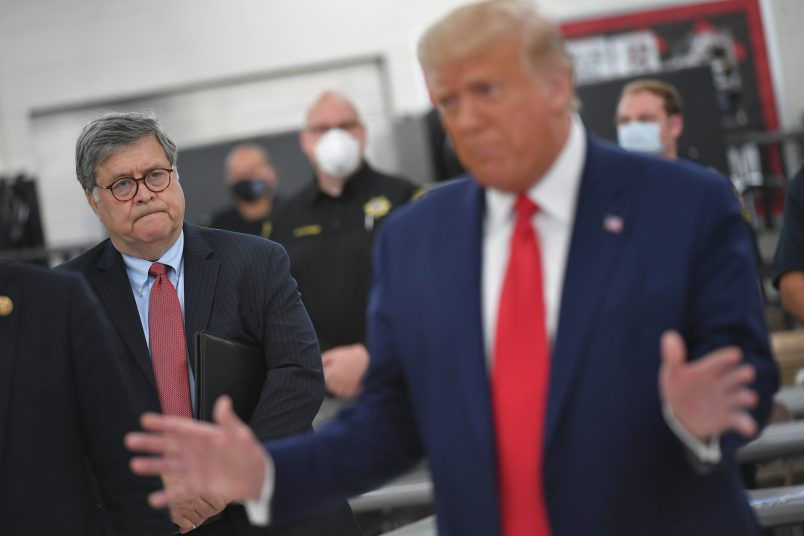President Donald Trump announced on Twitter Monday that Attorney General Bill Barr is resigning.
…Deputy Attorney General Jeff Rosen, an outstanding person, will become Acting Attorney General. Highly respected Richard Donoghue will be taking over the duties of Deputy Attorney General. Thank you to all! pic.twitter.com/V5sqOJT9PM
— Donald J. Trump (@realDonaldTrump) December 14, 2020
Trump appended to the tweet an obsequious letter from Barr, dated Monday, in which he confirmed his resignation and offered an “update” on bogus voter fraud allegations.
Barr has become the subject of the President’s ire in recent weeks, after announcing that the Justice Department had found no evidence of widespread fraud in the November presidential election.
“AG Barr resigned on his own accord,” a White House official told TPM. “He wasn’t pushed out or forced to resign. It was a very amicable meeting and as you can tell from the letter he thinks very highly of the President.”
The resignation also comes after the work of John Durham — the prosecutor tasked with investigating those who investigated Russia’s interference in the 2016 election — failed to produce any public report before Election Day. Trump was further infuriated after finding out that Barr kept the probe of Hunter Biden’s taxes quiet until after the election.
Trump’s turning on Barr came after a relatively long and cohesive working relationship, by Trump administration standards. Despite that, once the President distanced himself from his attorney general, the MAGA set wasted no time in parroting him, proclaiming Barr a RINO and little better than a Democrat. Just a few weeks ago, Trump refused to say whether he had confidence in his attorney general.
In his resignation letter, Barr offered cloying praise for President Trump, telling him that his “record is all the more historic because you accomplished it in the face of relentless, implacable resistance.”
Barr added that Trump accomplished his agenda in spite of the “frenzied and baseless” allegations that underpinned the Mueller investigation — which Barr described as “the nadir of this campaign” to cripple Trump’s presidency.
He provided a “greatest hits” list of administrative accomplishments wholly separate from his own department, praising Trump for economic achievements, Middle East diplomacy and his handling of the COVID-19 pandemic.
Barr himself stood out as an attorney general uniquely willing to contort the powers of his office to political ends.
He began a devastating tenure by mischaracterizing the results of the Mueller investigation to the public, before acceding to Trump’s requests to go easy on Roger Stone and Michael Flynn, both allies of the President.
In Stone’s case, Barr overrode line prosecutors to ask for a lighter sentence for the longtime GOP operative. For Flynn, Barr made the unprecedented decision to drop charges in the case, after the onetime national security advisor had pleaded guilty, and then withdrawn his plea.
Both cases enraged federal prosecutors and drew the ire of the judge presiding over the Flynn case, who refused to accept the DOJ’s motion to dismiss the charges absent judicial scrutiny of the about-face.
“Letting the most junior members set the agenda might be a good philosophy for a Montessori preschool, but it is no way to run a federal agency,” Barr said at a widely criticized press conference.
His tenure saw the DOJ devote resources to probing bogus claims emanating from Trump attorney Rudy Giuliani’s adventures in Ukraine, and to surging Bureau of Prisoners riot control squads to counter peaceful Black Lives Matter protesters in Washington, D.C. Under his leadership, and as Trump was publicly playing down the threat of COVID-19, the Department acted aggressively to back those bringing legal challenges to COVID-related public health ordinances.
And despite his December decision to state publicly that the DOJ had not found evidence of voter fraud after President Trump had clearly lost in November, Barr spent much of the run-up to the election laying the groundwork for such claims.
He told a Chicago radio host in September that fears that President Trump would refuse to concede in the event of a loss were overblown and projections of liberal malfeasance.
“They are creating an incendiary situation where there’s going to be loss of confidence in the vote, it’ll be a close vote,” Barr said. “People will say ‘The President won Nevada — oh, wait a minute! We just discovered a hundred thousand ballots, every vote must be counted!’”
Separately, Barr changed longstanding DOJ policy meant to keep federal law enforcement out of politicized election disputes. Under that policy change — which led to the resignation of the longtime head of the DOJ’s election crimes division — prosecutors were permitted to open investigations of election fraud claims before the results themselves were certified.
But in spite of that, Barr’s eventual admission that the DOJ had not identified any evidence of substantial fraud in the election triggered Trump’s ire.
“At a time when the country is so deeply divided, it is incumbent on all levels of government, and all agencies acting within their purview, to do all we can to assure the integrity of elections and promote public confidence in their outcome,” Barr wrote in his letter.
It was Trump, he concluded later in the letter, who “supported the men and women of law enforcement who selflessly — and too often thanklessly — risk their lives to keep our communities safe.”
This post has been updated.



